671 000 €
Turnover
36
Number of beneficiary artists
41
Number of employees
28 000
Number of spectators
Cambodia
Financial services
Funding granted
Investment of €88,000
Loan of €357,000*
(local currency equivalent)
Foundation Partner
since 2013
*Outstanding at grant value
Context :
Phare Performing Social Enterprise (PPSE) was founded in 2012 by the Cambodian NGO Phare Ponleu Selpak, which has been working for over 20 years to provide quality instruction and artistic education to children in great need. Today, the NGO educates over 1,000 children and has over 300 students in its performing arts school.
The company:
PPSE is a social enterprise that employs young artists from disadvantaged backgrounds. PPSE offers career opportunities in circus arts and combines the best of Cambodian cultural traditions and contemporary circus. PPSE extends and expands the work of the Phare Ponleu Selpak NGO by offering genuine career opportunities to professional artists from the Phare School while providing additional financial resources to the NGO to help it develop its social mission.
Impact :
“Every day, PPSE’s activities empower independent and skilled artists and their families to manage and control their own lives. Through its numerous performances, PPSE contributes to the international recognition of Cambodian performing arts. By helping Phare Ponleu Selpak Association become viable, more and more Cambodian children and youth from disadvantaged socio-economic backgrounds have access to education and artistic training while we support their families through social assistance programs.” (Dara Huot, PPSE General Director)
[Interview] CA Val de France supports a Solidarity Bankers mission in Cambodia
Interview with Laurence Lebrun-Renoult, Managing Director, CA Val de France
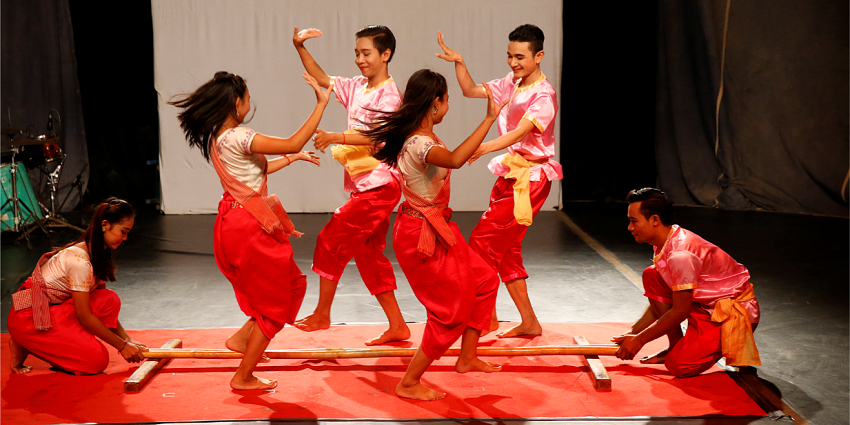
©Philippe Lissac
Launched by the Grameen Crédit Agricole Foundation and Crédit Agricole SA, Solidarity Bankers is a skills-based volunteer program that offers Group employees technical assistance missions with organizations supported by the Foundation. In 2019, the Val de France Regional Bank supported a Solidarity Bankers mission in Cambodia. For 10 days in September, Dominique Rombczyk, Risk Analyst at the Regional Bank, went to Cambodia to carry out a "financial management" mission for the Cirque Phare (PPSE), a social enterprise in which the Foundation is a shareholder.
– What was your Fund’s motivation in participating in the Solidarity Bankers program?
When one of our employees took the initiative to apply for a Solidarity Banker assignment, our Fund naturally supported his request and granted a week of skills sponsorship. Dominique Rombczyk was thus able to put his skills to use in the financial management of Cirque Phare (PPSE). PPSE is a Cambodian social enterprise that promotes social inclusion and youth empowerment through arts and culture. This is a source of pride for us because the approach is fully in line with our values of support.
– What feedback do you get from this?
Solidarity Bankers is one of those programs that makes us more aware of the social consequences of our banking activities. It advances a sustainable vision of finance, both in practice and in minds. Within our Regional Bank, the initiative led by our employee has helped share and disseminate within teams the human qualities of openness and commitment that we promote. In addition to communication at the Group level, his experience has, for example, made headlines in internal communications. For us bankers, knowing how to mobilize our skills to serve others, being open and adapting to different contexts and issues are aptitudes, "soft skills," that must inhabit our profession.
– What other actions does your Regional Fund take in terms of social inclusion?
As a regional bank, the issue of social cohesion in the regions is a strategic priority. The CA Val de France Foundation leads initiatives in support of local and regional associations working towards youth inclusion on the one hand, and intergenerational support on the other. We operate with them through skills-based sponsorship, on a voluntary basis, based on the same model as the Solidarity Bankers missions. For example, we are launching a youth training project, for which all our employees' expertise is welcome for support missions: assistance with financial management, activities, advice, etc. We also work with young people to support isolated people, often elderly people, which fosters dialogue between generations. All of this is part of a broader approach aimed at promoting the socio-economic autonomy of populations.
Source : Integrated Report 2019, Grameen Crédit Agricole Foundation. Download here
Travel diary of a solidarity banker in Cambodia
By Dominique Rombczyk, CA Val de France
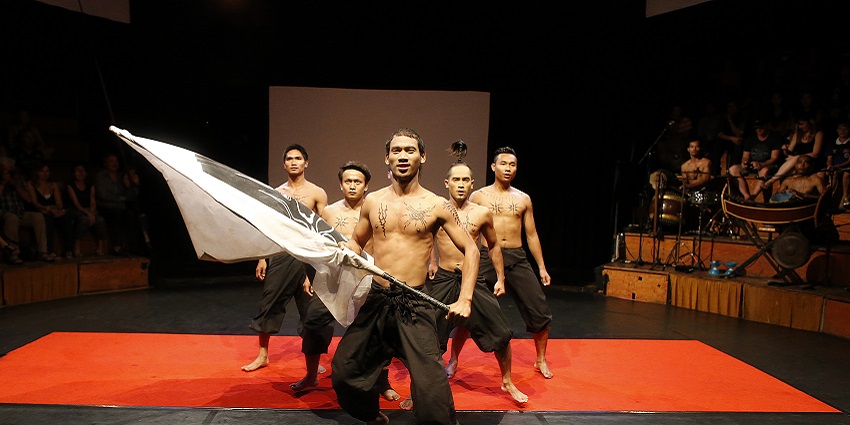
©Philippe Lissac/GODONG
Launched by the Grameen Crédit Agricole Foundation and Crédit Agricole SA in June 2018, Solidarity Bankers is a skills-based volunteer program open to all Crédit Agricole Group employees, supporting microfinance institutions and impactful businesses supported by the Foundation. Discover the opinion piece by Dominique Rombczyk, Solidarity Banker at CA Val de France, who traveled to Cambodia in 2019 to support Phare Performing Social Enterprise (PPSE), a social enterprise in which the Foundation is a shareholder.
When I discovered the Solidarity Bankers program, I remember searching for as much information as possible about the Grameen Crédit Agricole Foundation, Professor Yunus, inclusive finance, social entrepreneurship... Familiar concepts, shared values, but which seem to be part of another universe. The opportunity offered by Crédit Agricole and the Foundation to be able to take part in this universe was too exciting to ignore.
So I decided to apply and was selected to carry out the Solidarity Bankers mission with Cirque Phare (PPSE), a social enterprise that aims to promote social inclusion and empowerment of young Cambodians through art. The objectives of the mission were to identify the roles of the financial and management team, to train and develop a training plan on management and financial strategy concepts, and to propose financial monitoring and management tools.
The preparation phase was essential. After initial discussions with the Grameen Crédit Agricole Foundation team, I reviewed PPSE presentation documents, financial data, and general information to better understand the mission. In the weeks leading up to the departure, I held several contacts with the Foundation and the company to finalize the mission planning. The phone conversations allowed me to see the enthusiastic spirit of all stakeholders.
An exciting field mission
On September 7, 2019, we departed for Cambodia, accompanied by Hélène Keraudren-Baubé, the Foundation's Administrative and Financial Director, for a 15-day field mission. It was the Foundation's Executive Director himself who, at the airport, came to meet us with his family, thus establishing a very family-like atmosphere that remained with us throughout our stay.
During the first four days of the mission, we held several meetings with the CEO and department heads to analyze the functioning and organization of PPSE in order to jointly consider ways to optimize the structure. Ms. Keraudren-Baubé's presence during the first days of the mission was a real added value in proposing a relevant strategic plan for PPSE.
We also had the chance to attend a show put on by Cirque Phare, a show that blended theater, folk music, and Cambodian stories. The incredible performance by the young artists, who came from difficult social and economic backgrounds, was one of the highlights of my mission.
The second part of the mission focused primarily on training the financial division's teams. Training in accounting, analysis, and financial strategy helped consolidate certain concepts within PPSE's financial team, as well as identify training needs and enable the development of a training plan that the organization could subsequently implement.
Back in France
After returning from the mission, many projects were underway. The training plan, the strategic planning project, the drafting of a financial communication document for the PPSE Board of Directors, the implementation of a financial monitoring tool... Several weeks after returning, I sent my final report to PPSE. The discussions in the meantime were positive, and elements established during the mission are already being used and implemented.
I return to France with the joy of having been able to share the daily lives of so many passionate, enthusiastic, and brilliant people at the Grameen Crédit Agricole Foundation and PPSE. This mission allowed me to experience firsthand how a social enterprise works and the wonderful dynamics that drive these organizations. The idea of experiencing this on a daily basis is extremely tempting.
There is also a sense of pride: that of being part of a Group that takes concrete action, on the ground, with commitment, to defend social values.
Incidentally, but it is worth mentioning, a visit to the Angkor Wat temple, an emblematic place of Cambodia (which appears on its flag), cannot fail to leave a deep impression on all visitors who go there.
_________________________________________________
My thanks to the Grameen Crédit Agricole Foundation team for their support throughout the mission: Carolina Herrera, Céline Hyon-Naudin, Cécile Pochet, and in particular Hélène Keraudren-Baubé whom I recommend for any mission!; to Dara Huot and the PPSE team for their warm welcome; to Laurence Renoult, Tony Robert, Corinne Aubert, Annelise Lequeux, Sylvie Met-Poilong and Anne-Cecile Inglebert of CA Val de France for their support and to Aurélie Cacciotti of Crédit Agricole SA for the contractual and logistical aspects. As well as to all those not mentioned!
In the first quarter, the Foundation made three new investments in Asia
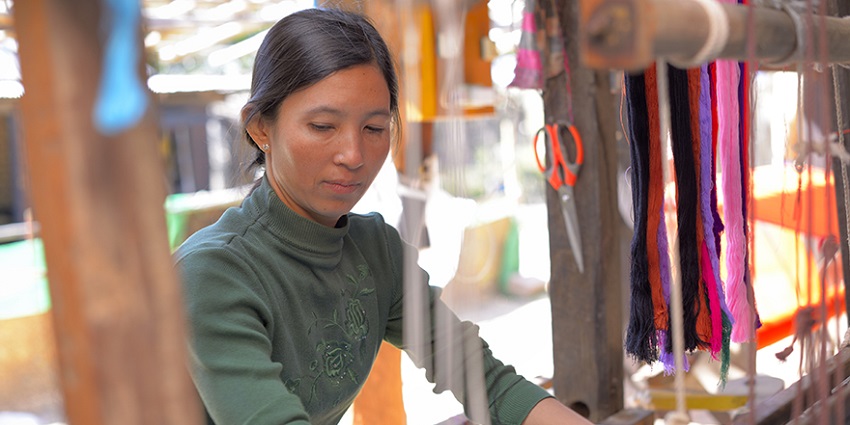
© Didier Gentilhomme
During the first half of 2019, the Grameen Crédit Agricole Foundation made three new investments in Asia, including a guarantee in India in partnership with CA-CIB India.
In Cambodia, Phare Performing Social Enterprise (PPSE) was granted a loan equivalent to €332,000. This partner, in which the Foundation has held a 15.51% stake since 2013, is a social enterprise that creates, produces, and distributes live performances and employs young artists from disadvantaged backgrounds.
In Myanmar, the Foundation also provided a new €1.8 million loan to Vision Fund Myanmar, a microfinance institution that lends small amounts of money to individuals who lack a measurable credit history, assets to secure loans, or access to traditional sources of financing. The institution currently has 183,000 active clients, including over 851,000 women and nearly 521,000 rural clients.
Finally, in India, the Foundation, in partnership with Crédit Agricole CIB India, has established a guarantee in local currency equivalent to €5.5 million on behalf of Fusion Microfinance Private Ltd. Founded in 1994 in northern India, the institution offers financial products and services to low-income individuals. To date, it has 1.4 million clients, exclusively women, located in rural areas.
To learn more about the Foundation's partners, click here.
Solidarity Banker missions to be filled in Kenya and Cambodia
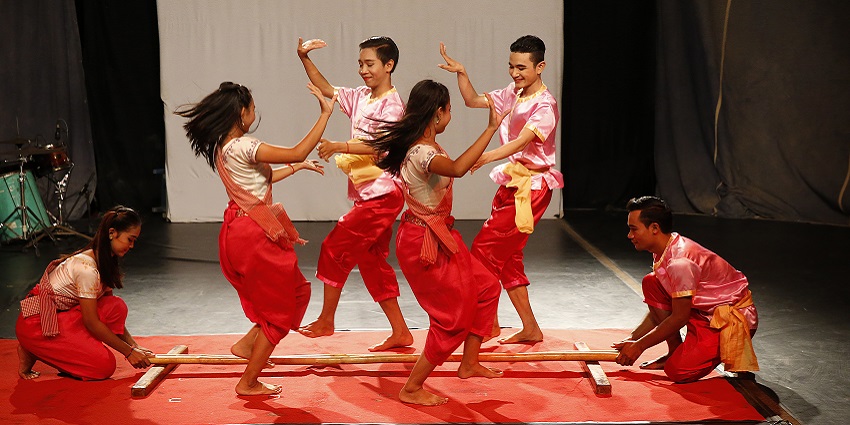
©Philippe Lissac
Two Solidarity Banker missions are available in Kenya and Cambodia: a Management Control mission to support the Musoni microfinance institution in Kenya and a Financial Management mission to support Cirque Phare (PPSE), a Cambodian social enterprise.
Solidarity Banker is a skills volunteering program launched in 2018 by the Grameen Crédit Agricole Foundation and Crédit Agricole SA, open to all Crédit Agricole Group employees on behalf of microfinance institutions or social impact companies, partners of the Foundation.
The missions to be filled
A Management Control mission is planned for the third quarter of 2019 to support Musoni in Kenya. Musoni is a microfinance institution that provides financial services through mobile payments to people excluded from the traditional banking system. To strengthen performance management, Musoni wants to implement a balanced scorecard methodology. The Solidarity Banker will be responsible for structuring a balanced scorecard with key performance indicators and making recommendations on its implementation.
A "Financial Management" mission is planned for September 2019 to support Cirque Phare (PPSE) in Cambodia. PPSE provides employment opportunities for Cambodian artists and sustains the country's arts sector. PPSE has now entered a growth phase and requires strengthening certain aspects of its management, particularly in terms of strategy, finance, and human resources. The Solidarity Banker will be responsible for proposing monitoring tools and making recommendations on the organizational structure.
How to apply?
Several missions are coming up on CA Solidaires. To discover them:
1. Go to the CA Solidaires website “Find your mission”
2. Enter "Grameen Foundation" in the search bar. All Solidarity Leave offers will appear!
3. Click on the offer of your choice, you will find all the information necessary for your application.
More information: carolina.herrera@credit-agricole-sa.fr
To learn more about the missions available, click here.
[INTERVIEW] “Life must go on, we must not lose hope”
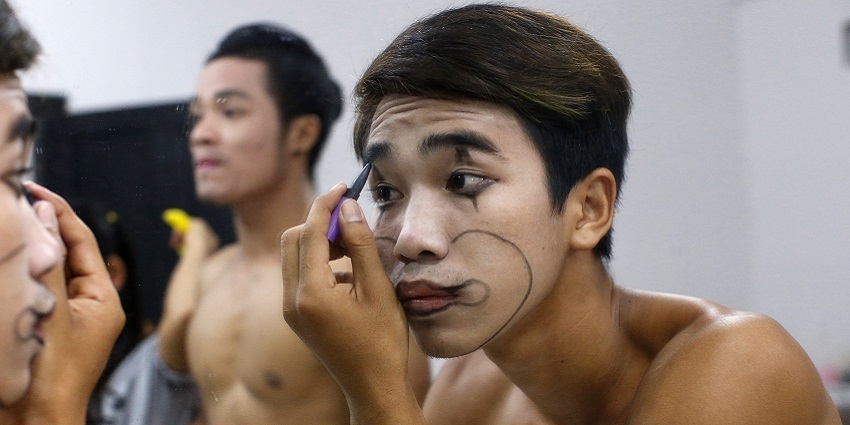
©Philippe Lissac/GODONG
CambodiaMag interviewed Dara Huot, Director of Phare "Performing Social Enterprise," a partner of the Grameen Crédit Agricole Foundation. He shared his concerns and hopes for the Phare circus' social enterprise.
Since March 17, performances at the Phare Circus, one of the main attractions in Siem Reap and Battambang, have been suspended...
Yes, we were implementing a government decision against performance venues. Before that, we had implemented all the necessary measures to disinfect the premises between each performance and respect social distancing between spectators. The temperature was checked for each person entering the big top, and hand sanitizer dispensers were placed throughout. But in any case, the number of spectators was gradually dwindling. The government decree only hastened a closure that would have been inevitable.
How did the staff react to this closure?
Phare is a very large social enterprise, split between Siem Reap and Battambang. Here, we have 40 artists and 70 employees. The Battambang school, which offers training in circus, but also in graphic animation, dance, painting, and theater, has 110 teachers for 1,200 students. When the closure was decided, we took the opportunity to resume our "to-do" list—you know, all those little things that accumulate over time and that we generally reserve for the off-season.
We cleaned everything, repainted, and did all the maintenance work... And then, when we finished all that, everyone went home. The vast majority of the staff comes from Battambang, so many have joined their families there. All the artists continue to train hard, for the resumption of shows, but also for the upcoming tours. Some have been canceled, but we hope to be able to do the one planned in France for this winter.
Are salaries still being paid?
All salaries were paid throughout the month of March. Starting in April, they were reduced by 50 %, and this will continue for the following months. It is unthinkable to leave our employees without any income, and we do not hesitate to dip into our cash flow to do so. But how long can we continue like this? After 3 or 4 months, the coffers will be empty... Especially since we still have to pay all our rent.
Do your employees receive support from institutions?
No, it's not like in France, where compensation is granted to people who find themselves unemployed. Nothing is planned for them here, and the situation is all the more difficult because many employees have contracted debts with banks and microfinance organizations. The interest they have to repay each month is very high, and I don't see how they'll be able to get out of it. The only hope would be for these organizations to relax the repayment terms. Perhaps by reducing interest rates, spacing out repayments, or even suspending them until things return to normal. A moratorium on rent could also help many Cambodians see out the crisis. As things stand, repaying a loan, paying rent, and supporting one's family when one has a reduced salary or, worse, when one finds oneself unemployed will pose major problems for a large part of the population.
How will this crisis change Siem Reap?
Since the city opened to mass tourism, that is, some twenty years ago, the number of visitors has only grown exponentially. Infrastructure, however, has not necessarily kept pace. The environment has suffered greatly from the increase in visitors, waste is not always well managed, and access to water and its quality are still problematic in certain neighborhoods. Electricity needs have increased, but outages remain numerous. Why not take advantage of this involuntary "pause" to renew ourselves, question ourselves, and thus beautify the city? We must remain positive, try to see what we can learn from this ordeal. Life must go on, we must not lose hope, and continue to be positive despite the circumstances. We must, more than ever, take care of ourselves and our loved ones, and stay strong. This is important for ourselves, but also for those around us. Everyone hopes that this pandemic will last as short a time as possible. 2019 was a difficult year, and 2020 will be even worse. But we will get through it, and I hope we will come back tougher from this ordeal. Even if it will, of course, be very difficult to get back on our feet.
